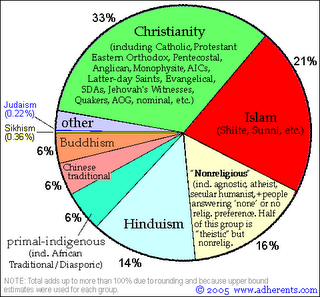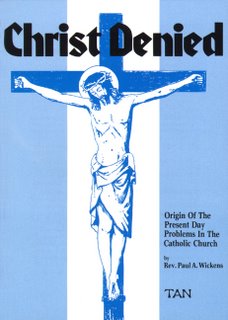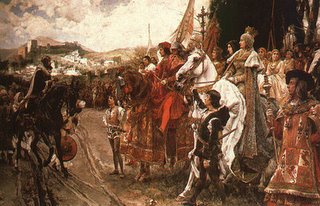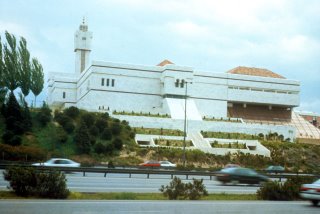As the old traditional Church became young again, a relatively few Catholic families and communities exhibited a vigor beyond their numbers, and encouraged the growth of new religious orders and activities. [These communities provided the source of the “Martyr Bishops” of the Islamic Conflicts in the late 21st century].
Traditional lay-run communities and enterprises dominated Catholic evangelical activity in the early decades of the 21st century, with extensive expression on the Internet, TV, radio, and in several acclaimed movies beginning with The Passion of the Christ in 2004. This activity was severely restricted after a police state was implemented after the Great Trial of 2022 and during the severe financial disorder that immediately followed.
Pope Benedict XVI died in 2014 after a productive papacy, although statistics representing Catholic religious life did not begin to increase significantly until the next decade. He is remembered for his adroit establishment of control of the Curia and seminaries, significant revision of the Novus Ordo liturgy, and appointing mostly loyal and orthodox bishops.
Benedict XVI’s 2009 visit to China established the framework for a considerable growth of Catholicism in China. Even though the majority of Chinese has not been baptized [in 2098], they are mostly friendly to the Catholic Church and have assisted in critical peacekeeping and humanitarian efforts.
Key results of the Papal visit were the official abandonment of the one-child family in 2010, a final agreement for the selection of new Chinese bishops and control of church property, and the partial freedom to evangelize including publishing Catholic newspapers. Perhaps most importantly, Pope Benedict and Premier PuLin Wao initiated regular communications on Islamic advances in Asia and other non-European countries.
In the U.S. and other countries of the Western Hemisphere, Catholicism did not grow much even during the Great Trial that began in 2022. Secularism remained very influential in people's lives. Protestant evangelical churches made large inroads into Catholic Latino populations beginning in the 1990s. This loss continued until 2030 when Latino Evangelical Churches in Mexico and Brazil agreed to meet the Pope and discuss a united front against the Muslim advance.
The results of that meeting were not foreseen. The first result was that key laymen within the evangelical congregations and the Catholic Church agreed to become co-leaders of the United Christian Front (UCF) within each country. This non-government organization (NGO) was responsible for insuring joint political actions that would adequately respond to increased Muslim agitation and advances.
The second result was that the UCF was populated with the Church's most energetic and personable Catholics who quickly brought several key Evangelical leaders into the Church. Others followed. [I will only summarize the story here because the full history of The Grand Alliance is described in my earlier book of the same title.] In short, the Pope and more than 20 important Evangelical leaders signed the Grand Alliance, a charter for the establishment of the New Catholic Evangelical Church in a 3-step program.
The Evangelicals insisted on keeping many of their own faith practices and church services, but agreed to institute reforms to bring their church services and teachings to minimum Catholic standards (Simple Catholicism: Essential Catholic teachings, which some say was based on Mere Christianity described by C.S. Lewis and an old Catholic Catechism used by the Church in the 20th century).
The Catholic Evangelical Church initially operated without properly ordained church ministers and were under the direct guidance, if not authority, of the Pope. Each evangelical congregation was instructed to study Simple Catholicism and worthily receive spiritual communion. This 'Communion of desire' wanted the grace of unity with God in Holy Communion. [The fruits of that desire are given to a good soul even before actually receiving Communion.] The ministers also encouraged the desire for perfect contrition among the souls under their care. A soul that has perfect contrition is absolved of all sin. Both of these activities prepared souls for the Sacraments of the Holy Eucharist and Penance when the opportunity finally came.
The second step of the concord established a schedule for the training and priestly ordination of those ministers who agreed completely to Simple Catholicism, and who also agreed to study the full teachings of the Catholic Church under the personal direction of an advisor/director appointed by the Pope.
The third step was the priestly ordination of trained and loyal ministers who accepted the full teachings of the Catholic Church, followed by consecration of three bishops from the group. The zeal of the highly motivated new Catholic Evangelical Church led to almost half of South and Central American Latinos joining within the next 20 years. The evangelical churches who did not respond favorably were left on the fringe of the UCF which had become a critical factor in the preservation of all Christian populations.












